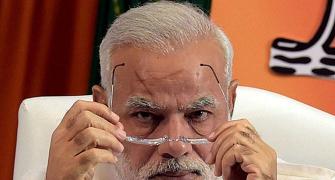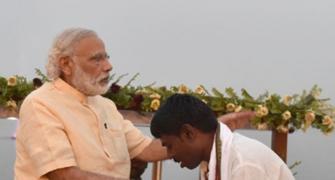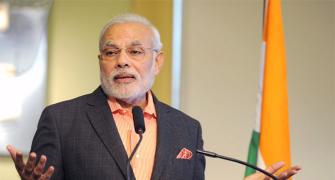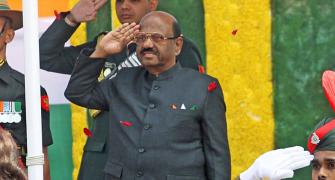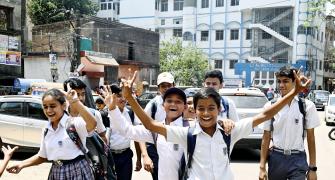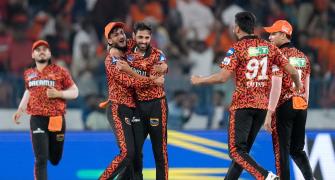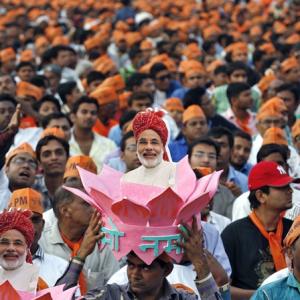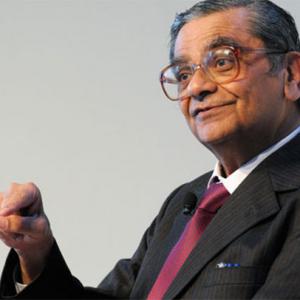If Mr Modi has to win, he must convince the people of this country how his reforms improved the quality of their lives, says A K Bhattacharya.

Prime Minister Narendra Modi has so far delivered three Independence Day addresses from the ramparts of the Red Fort.
His address delivered on the occasion of India’s 70th Independence Day on Monday was distinctly different in tone, content and focus from the ones delivered in 2015 and 2014.
How different the three speeches are from each other is a reflection of Mr Modi’s evolution as prime minister and his own assessment of the performance of his government.
The difference in speeches is also an indication of the shifting policy priorities of the government as Mr Modi prepares to mount the next round of electoral battles. A closer analysis of the three speeches will, therefore, be instructive.
There is little doubt that the speech in 2014 had the flourish of a new prime minister’s maiden speech from the Red Fort.
Mr Modi introduced himself to the nation as a Pradhan Sevak (prime servant) instead of the country’s prime minister.
He urged the nation to declare a moratorium on violence triggered by considerations of caste and community. All members of Parliament were even asked to adopt a village each.
Mr Modi also admitted to being an outsider in New Delhi.
Not surprisingly, he announced the decision to abolish the Planning Commission - a move that suggested the government’s penchant for bold experiments with a new architecture for expediting growth and development.
Mr Modi’s debut speech on the occasion of the Independence Day in 2014 was also marked by the unveiling of several new government schemes - Make in India to usher in policies to boost domestic manufacturing, Jan Dhan Yojana to provide bank accounts to every Indian, Skill India to enhance the skilling levels of Indian workers, Swachh Bharat Mission to build toilets in villages to make India free from open defecation, and the Digital India programme to introduce internet-based services to improve governance.
Looking back, the action plan that he unveiled in his first Independence Day address was ambitious.
There were some early successes as well. The Planning Commission was abolished, paving the way for the creation of the NITI Aayog by January 2015.
The Jan Dhan Yojana got off to a quick start, opening new bank accounts for those without any banking access and, according to Mr Modi’s report card, 210 million accounts have so far been opened.
Similarly, the Swachh Bharat Mission has led to the construction of 20 million new toilets.
Initiatives on Make in India, Skilling India and Digital India were also undertaken, though Mr Modi himself did not indicate the extent of their success.
His second Independence Day address was completely different. He announced only two new schemes.
A scheme on Start-up India was launched to encourage the growth of technology-based entrepreneurs riding on innovation.
Another scheme – Stand-up India – was launched to provide a supportive ecosystem for entrepreneurs from socially and economically backward sections of society.
He did talk about the need for creating jobs and even promised to link fresh investments with the creation of a minimum number of jobs.
In sharp contrast, Mr Modi’s Independence Day address on Monday was not just about recounting what his past schemes had achieved, but more importantly it was about explaining to the nation what he believed should be the goal of good governance.
It was a unique exercise, rich with political significance, to outline yardsticks with which the people could measure the success of governance.
This was also Mr Modi’s way of making the people conscious of how reforms and governance would directly touch their lives.
Thus, Mr Modi talked about a host of issues — online delivery of services that are faster (quick tax refunds or passport delivery), electrification of villages, speedier execution of projects, targeting of inflation so that it stays within a band of two to six per cent, expanded coverage of Aadhar-linked delivery of subsidised cooking gas cylinders, increased usage of light-emitting diode lamps to reduce lighting costs and pollution, efficient health care services for ordinary people, connecting agricultural markets across the country, incentives and concessions for farmers growing pulses and other crops, clearance of arrears of sugarcane dues to farmers and then the roll-out of the goods and services tax that would eliminate the multiplicity of levies, prevent harassment of traders and businesses, while reducing the overall burden of taxes.
Mr Modi’s third Independence Day speech should also leave nobody in doubt that his government is now in implementation mode.
The days of announcing big schemes are over. The focus is now on the forthcoming electoral battles.
If Mr Modi has to win those, he must convince the people of this country how his reforms or schemes helped them or improved the quality of their lives.
If that means discarding the idea of strategic sales even after its announcement in the last two Budgets, Mr Modi seems completely unperturbed.
That is because Mr Modi is perhaps aware that reforms may not always help win elections.
Many of his predecessors paid a huge electoral price for not selling reforms to the people.
More important, therefore, is to explain how the reforms will benefit the common man, small businesses and farmers.
That is what Mr Modi tried to achieve through his Independence Day address on Monday.


